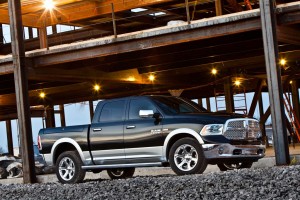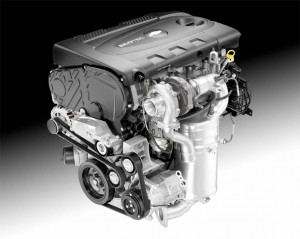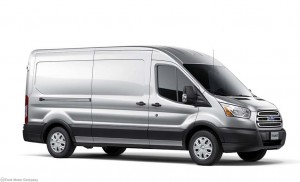Chrysler will add a diesel option for the Ram 1500 pickup, making it the only automaker to offer the high-mileage technology on a half-ton truck. It could be a significant additional inducement the announcement coming barely a month after the Ram 1500 was named North American Truck of the Year.
But Chrysler may not be the only maker to market a diesel standard-duty pickup for long. General Motors is reportedly considering such an option for its newly redesigned Chevrolet Silverado and GMC Sierra models, while Toyota and Nissan may add diesels when their redesigned Tundra and Titan models reach market.
Meanwhile, diesels are rapidly gaining ground in other market segments. Chevrolet last week unveiled its new Cruze Diesel, the first passenger car model from General Motors’ largest brand to offer the powertrain technology since 1996. Mazda will add a diesel for its new Mazda6 later this year. And even Ford’s long-standing resistance to diesel power in U.S. passenger cars finally may be crumbling.
Speaking to students and faculty at the University of Michigan, Ford Chief Operating Officer Mark Fields said the company is prepared to act quickly if it sees the need to offer diesels in the U.S. That could signal a significant shift, Ford until now insisting it could better serve the market with its gasoline-powered EcoBoost technology — which shares some key components of modern diesels, including turbocharging and high-pressure fuel injection.
“If we see diesels start to take off here in the U.S., we can react very quickly,” Fields told students and faculty at the University of Michigan’s Ross School of Business.
There is a major shift in the industry mindset about diesels — one spurred by growing signs of a consumer shift, as well. European makers such as Mercedes-Benz and Audi have been the most aggressive at introducing the technology into the States, and Volkswagen, the largest seller of diesel passenger cars in the U.S., said it is having trouble keeping up with demand for s0-called oil burners. VW of American Group CEO Jonathan Browning has told TheDetroitBureau.com that if his subsidiary can get enough engines it believes 30% of the Passats produced at a plant in Tennessee could be sold with diesels.
Chrysler’s announcement reflects the fact that diesels have remained a familiar part of the commercial truck industry in the U.S. And, indeed, while it has not yet committed to passenger car diesels, Ford has decided to offer a 3.2-liter oil burner in its upcoming Transit van, which will largely target commercial markets.
(Click here to read more about the Transit diesel.)
Ford’s Fields said that the Dearborn automaker continues to worry that American consumers aren’t ready to accept diesels, however. “There’s still a consumer bias, to a certain degree, against diesels,” he cautioned.
Part of that bias stems from concerns about diesel reliability, a long-lingering problem from the early ‘80s when poorly conceived GM diesels suffered premature failures. The last generation of diesels were also notorious for their slow acceleration, rough ride and sulfurous smoke.
But the image of the diesel has shifted markedly in other parts of the world, especially Europe, where the technology accounts for nearly half of all new vehicle sales. The modern, turbocharged diesel is quick, quiet, smooth and clean. And due to tougher emissions standards, U.S. diesels will produce even lower levels of particulates and oxides of nitrogen.
(Click here to read about the Cruze diesel.)
(Click here to read about the Mazda 6 diesel.)
Despite the aversions to diesels, they make a lot of sense in the U.S., more sense, in fact than hybrids for many drivers, say analysts such as Joe Phillippi, of AutoTrends Consulting. While hybrids tend to deliver better mileage in stop-and-go urban environments, diesels work well on the freeway, a staple of U.S. motoring.
The Detroit Three have long offered big V-8 diesels in heavy-duty trucks because of their exceptional torque, which is necessary for towing heavy trailers. In fact, Ford and GM have been involved in a war of one-upmanship, each angling for bragging rights for their big diesel engines. But even though diesels would seem to be a perfect match for light-duty full-size trucks, none of the Detroit Three have offered them — until now.
The Ram 1500 will get a new 3.0-liter turbodiesel produced by Italy’s VM Motori. That’s the same diesel that will appear in the updated Jeep Grand Cherokee in May. And Chrysler has been using diesels from VM Motori in its European models for a number of years.
The maker isn’t yet offering the ratings on the diesel Ram, but in the Jeep it will deliver 240 horsepower and 420 lb-ft of torque. Diesels are designed to deliver significant torque levels which offer particular advantages in cargo hauling.
(Click here to read about the new Jeep diesel.)
The arrival of the Ram 1500 diesel is considered likely to further encourage Chevy to drop an oil-burner into the new Silverado, while the Toyota Tundra and Nissan Titan could follow suit when their next-generation models reach market.
(Click here to read about Nissan’s talks with Cummins about supplying diesel for new Titan pickup.)
Other automakers including Mini and Jaguar-Land Rover have also hinted that they may offer diesels.
Clean diesel technology can come with a steep price tag — on some models a more than $3,000 price premium — though it is often less than a hybrid option on the same vehicle. Diesel fuel also typically costs about 50 cents more per gallon than premium gasoline.
Currently, diesels make up just 3% of passenger vehicle sales in the U.S., but some forecasters anticipate the number jumping sharply in the coming year. It helps, says the Diesel Technology Forum, that the number of diesels on the U.S. market will double over the coming year. But diesel market penetration will probably never approach that in Europe.
With automakers under intense pressure to increase fuel economy, that could be a legitimate strategy for more automakers to encourage buyers to choose higher-mileage models.
(Click here to read how automakers expect to meet the upcoming 54.5 mpg standard.)
Paul A. Eisenstein contributed to this report.




In spite of the EPA and Obama efforts to discourage sales of clean Diesels in America, customers are demanding them. This is good for America and air emissions.
Unfortunately Marchionne has stabbed Chrylser employees and U.S. customers in the back by not using the Cummins Diesel that was developed for these light duty trucks and SUVs. Instead RAM will be using a Fiat Diesel from VM Motori. If this Diesel is not reliable, then it will be another black eye for U.S. auto makers circa the 80’s.
Price will however be a consideration so the U.S. auto makers better not get too greedy. The Euro car makers selling Diesels in the U.S. have seen some customer backlash from price gouging. In addition current Diesel fuel prices make it hard to justify the price premium unless you plan to keep the vehicle for 5+ years, which most consumers do not.